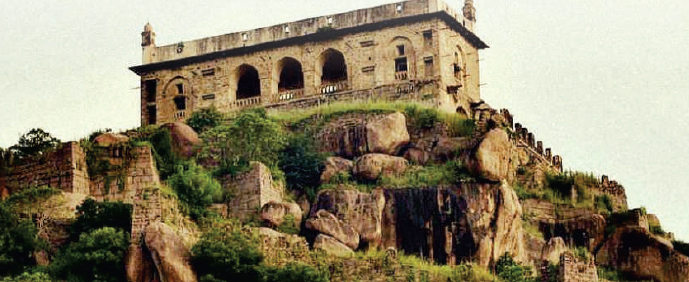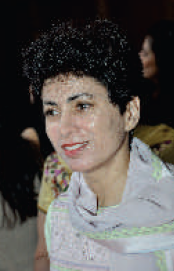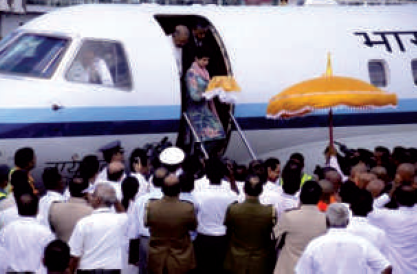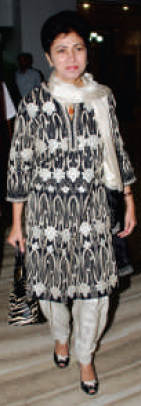Chaudhary Dalbir Singh & Kumari Selja
This is a collection of articles archived for the excellence of their content. Readers will be able to edit existing articles and post new articles directly |
Hisar
Hisar's distinctive family
Chaudhary Dalbir Singh & Kumari Selja
India Harmony VOLUME - 1 : ISSUE - 5 JULY-AUGUST, 2012
The Haryana story
would be grossly
incomplete if no mention is made of
one of the most outstanding
personalities of the State
who, unfortunately, got
much less accolades for his
strength of character and his
undisputed talents than he
deserved. The man in
question is Choudhary
Dalbir Singh – and his
daughter is Kumari Selja.
Hissar, once considered a backward and neglected district of pre partition Punjab has seen dynamic growth in the modern State of Haryana. Post partition, it was Chaudhary Dalbir Singh and his daughter Kumari Selja who have represented this area as members of Parliament for almost half a century and their selfless service has put it on the development map of the region.
Chaudhary Dalbir Singh was born in a Dalit family of landless agricultural labourers in village Prabhuwala in Hissar District of pre-partition Punjab. This was one of the most desolate, waterless sandy districts of the state. Bhiwani and Hissar during the '40s and '50s of the last century were known to be dusty towns, where acute water scarcity was the rule in the summers. The season brought in hot abrasive sand dunes. Several large ponds had been dug virtually in each village to store rainwater for drinking and bathing as also to provide for the needs of cattle. The sand dunes encroached right into the western limits of Bhiwani. Life was indeed a tough proposition in this area.
Dalbir Singh was very early in his life spotted as an exceptionally intelligent child and though he was the youngest child in the family, it was decided that, come what may, he would get the best possible education that the family could reasonably provide. Once when the infant Dalbir was very seriously ill, a very gifted and learned sadhu cured him and while leaving predicted that “one day this child would ride an elephant” (in other words, be a great man). The prophecy came true. Dalbir's young days both in the schools in which he studied, namely, the primary school at Prabhuwala, the charitable school in which he did his middle levels and the government high school from which he completed his school education, were all replete with his outstanding academic performance, as also his excellence in the field of athletics and sports. But sadly, they were also full of humiliation from the taunts and jibes of some fellow students belonging to the upper caste or to the rich and landed gentry. This continued also through his college days, first in Lahore and then, after partition, in Rohtak from where he graduated. But Dalbir Singh was made of sterner stuff. He ignored all the unsavory behaviour of some of his fellow students, put that behind him and developed into a well-rounded human being, sensitive and determined to do whatever he could to eradicate these unfortunate traits of the discriminatory and obscurantist forces of our society. – He grew up into a man of robust health, full of humour with an inexhaustible fund of jokes and Haryanavi stories which he used to devastating effect to deal with awkward and tricky situations that confronted him in his career. The family expected him to take up the job and alleviate poverty, bring some prosperity and happiness to the family.
Finally one day Dalbir Singh told his father that he would not take up a job .He had endured too much caste, creed, regional, rich and poor discrimination so he was determined to devote his life to resist evils of the Indian society and help reform it. He remembered that while studying at Lahore he was constantly a victim of cruel and inhuman treatment at the hands of prince lings and rich students. His mind was made up and he would strive and try to eliminate various evils and ills of the Indian caste based society .Father Kani Ram agreed.
Next day Kani Ram watched his son speaking for the first time at aCongress party public rally at Hissar and criticizing Punjab chief minister Kairon , whose achievements in the development of the state were eulogized and lauded by all and sundry . Dalbir Singh rightly proclaimed that ' yes, Punjab had progressed but only the Punjabi speaking part i.e. Jullundur division and not the backward Ambala division of which Hissar was a part It remained so till the Sikhs after many agitations and Morchas got their Punjabi Suba and the backward region emerged from the shadow of under development and neglect in 1966 . The new state of Haryana led by some dynamic leaders, taking advantage of many inbuilt and inherent advantages including proximity to Delhi has emerged as a most dynamic and rich state of India. While a minister in Delhi for nearly two decades, Ch. Dalbir Singh assiduously helped out in pursuing the economic development of Haryana by taking up his state's cause with the centre. I have a feeling that he cherished a deep desire to lead the Haryana government and implement his vision of his home state himself. But his opponents in the party in Haryana ganged up and kept him away from the state. Having watched the freedom movement from close quarters under the leadership of Mahatma Gandhi and Jawaharlal Nehru andCongress party's ideology of secularism, equal rights for all religions and special incentives to uplift scheduled caste and tribes, neglected, humiliated and exploited since millennia attracted young and idealistic Dalbir Singh, since he had himself suffered at the hands of upper castes and rich all his life. But he rarely mentioned these hurts to me. He sometimes would relate how petty officials mistreated the public specially the poor and the downtrodden.
Ch. Dalbir Singh remained steadfast and true in his loyalty to theCongress and its ideals and policies , in a state where many a politicians ideology is fickle and saleable ,which gave the name Gayaram Ayaaram politics i.e. of shifting and changing party affiliations for gain .I remember very vividly one evening in 1967 when I dropped at Ch Dalbir Singh's flat on South Avenue .A number of well known Haryana politicians , who did well for themselves had just visited him after having pledged loyalty to Moraji Desai who had challenged PM Indira Gandhi's leadership.” How dare they even suggest such a thing, he fumed .He remained steadfast to theCongress and its ideology till the very end. He never wavered, never ever.
Young, enthusiastic, wide eyed and idealistic when the 1952 elections were, he and Godara turned up at theCongress party office in Delhi .By luck Nehru arrived and was very impressed by Dalbir Singh, a young enthusiastic graduate, a rarity among Dalit aspirants .He and Godara, in spite of opposition from older and well established leader's opposition like Devi Lal, were both allottedCongress party tickets. Dalbir Singh won from Tohana but his election was set aside on the pretext of being under age i.e. less than 25 years .By the time he won the election petition time had arrived for the 1957 elections. Kairon had returned to power by then. A down to earth politician and good administrator, he recognized the talented, idealistic Dalbir Singh's dedication and gave himCongress ticket in 1957 . Not only that after the elections Dalbir Singh was inducted into the council of ministers as deputy minister .He was barely 30 years in age .The rest as they say is history.
Chaudhary Saheb was soon a great favorite of Kairon because of his sincerity, hard work, sense of purpose and integrity.
His family had been completely swayed by the Arya Samaj philosophy and ideas and Dalbir found himself in sync with it. No doubt within himself, Dalbir would have cherished a desire to lead his state of Haryana; but political upswings caused him to be catapulted to the Centre where, in course of time, he headed the Ministry of Fertilizers and Chemicals.
What distinguished him through all those years and remained an indelible trait of his personality till his death in 1987 were his unimpeachable integrity; his steadfast belief in and adherence to his moral values and principles and his unswerving loyalty to his party and its leader – virtues which were even then rare and remarkable; but which today would put him in a totally different and distinctive class of active politicians. When he first got elected to the Lok Sabha, he sold off his Ambassador car because the salary he drew as an MP would make it impossible to maintain it, even though the price of petrol was then just Rs.1.10 ps. per litre – a small but telling piece of evidence of the impeccable standards of integrity which he steadfastly followed.
Such was the man who surmounted dire poverty and humiliation; never lost his sense of humour; and never compromised his total integrity. He rose from the humblest beginnings, and by sheer merit, hard work and strength of character rose in the political firmament until death snatched him a little prematurely.
He left behind two daughters. The elder one is married, but the younger one – Kumari Selja – has chosen to follow in her father's footsteps and taken to electoral politics. She has emerged as a highly regarded political figure of the State with the same characteristics as her father of absolute integrity, grace and elegance, deft handling of her various responsibilities and committed to serve the cause of her state, her country and, above all, the people whom she represents. Born in 1961 Kumari Selja did not have the turbulent childhood of her father. Her early schooling was at the Convent of Jesus and Mary, New Delhi, as her father was by then already an MP and later a Ministry. Even though born to privilege, impeccable honesty, good manners and austerity were the watch words at home. She later moved to Chandigarh and completed her M. Phil from Punjab University. The untimely demise of her father catapulted her into national politics at the young age of 25. It was Rajiv Gandhi's faith in her and her father's legacy that has seen her go from strength to strength in her career. Currently, as Union Minister of Culture and Housing and Poverty alleviation, Kumari Selja is a cultural icon herself. She represents a post independence generation, born in the euphoria of freedom, confident, articulate and cosmopolitan. Her own personality is a symbol of inclusiveness. Her exposure to her Dalit roots Christian values at school. Urdu language spoken at home contributed to her evolution as a composite Indian. She embodies in herself the values enshrined in the Constitution and has made India justifiably proud. The maturity with which she fields tricky questions posed to her is brought out by the following extract of a press interview given by her when the very delicate issue of the “Khap Panchayats” of Haryana and its neighbouring areas was prominently in the news and was being vigorously defended by village elders across the state. She was asked about her family background and about the Khap Panchayats.
The questioner had asked “What does it mean to be a politician who is a woman and a Dalit from a state which has been in the news for all the wrong reasons—the Mirchpur incident involving violence against Dalits or khap panchayat demands on gotra marriages? What do you have to say about these problems?”
Her answer is an excellent example of her candour and her tact.
“My father was a prominent leader of Punjab, and then Haryana. He happened to be a Dalit. In his time, there were no such labels. After he passed away, I was asked to join politics and contest in his place. I contested in 1988 from my father's constituency, Sirsa—I belong to Hissar, and before the delimitation of 1975, our village was also part of the Sirsa parliamentary constituency. I was about 25 years old, absolutely new, raw. I owned just two cotton suits then. I remember, during campaigning, there were dust storms all the time. You could not see the sun. Often, we could not even see the road. We did not have AC cars. We travelled in an Ambassador. At one point the engine heated up and in some village, they put Rooh Afza in it because they thought it will cool the engine better!
Basically, Haryana is dominated by one caste, the Jats. But traditionally it hasn't been like that. These are incidents which need to be tackled very sensitively. We—and I, as a Dalit—should understand people's feelings and respond to that. I have to empathise, I have to act as a bridge. I think it is for the leaders to come forward, whether they belong to political parties, whether they are political activists or come from khap panchayats.
Most of us who come from villages subscribe to this
concept of not marrying within the gotra. I do not
think it is such an issue. We are Arya Samajis and the
Arya Samaj has been at the forefront of social
reformation. So we have always supported social
change when it is for the better. We need to be
forward-looking. Scientifically, you cannot dispute
that marrying into the same gotra is not good. It is a
complicated thing. But when these issues go to an
extreme, it is wrong. Where is the honour in honour
killings? A killing is a killing. You cannot take the
law into your own hands. I am very clear on this
matter–the Constitution is supreme.”
All those who have dealt with her have been struck by what they describe as her most unminister like behaviour and approach. She has always impressed people with her sincerity, her positive attitude and her integrity–qualities which she has inherited from her father obviously.
With leaders such as Kumari Selja and others, the future of Haryana does appear to be in safe hands.
Anil Dharkar writes...
“She is not at all like a minister.” That comment was heard again and again through the evening. The sentence tells you two things: first, we don't hold our ministers in high esteem and second, Selja Kumari is cut from a different cloth. It isn't khadi to start with. Unless you are a fashion designer (or a woman) you don't observe details of what someone is wearing, especially in a crowded room, but if memory serves right our Union Minister for Culture was in a smartly cut silk salwar kameez in muted colours. But it wasn't her clothes people were talking about: what the culturati gathered in Tasneem and Vikram Sigh Mehta's house were referring to was the way Selja Kumari conducted herself. With a quiet dignity complemented by her refined and measured speech. Since much of what she and I talked about at some length was off the record, it would be unethical to go into details, but one central point did emerge, which to me—and possibly to you – was quite startling: if our cultural institutions are languishing, it isn't for want of money. The funds are there; they can be made readily available; the problem lies in implementation and using them prudently and quickly, which aren't mutually contradictory as most of the bureaucracy seems to believe. I made the case – and I am sure I wasn't the only one doing this – that our cultural institutions should be given autonomy, especially from Delhi raj. Take the case of the National Gallery of Modern Art in Mumbai. After Saryu Doshi it hasn't had its own Director but is remote controlled from Delhi. Surely in a metropolis like Mumbai where most of the country's artistic movements have begun, the NGMA should be of Mumbai and for Mumbai which can only happen if it's by Mumbai.
Coming back to the “she is not like a minister” comment, if Selja Kumari isn't like a minister, what is a minister like? The obvious antithesis is someone like Mamta Banerjee. (A friend swears this is true: in an impassioned speech rebutting some disparaging comments by a political opponent, she is supposed to have said, “If they give me tat, I will give them tit. Other ministers who fit our pre-conceptions of ministers are Spectrum Raja and any of his DMK cronies, Sharad Pawar, Sushil Kumar Shinde, Veerappa Moily, M K Azhagiri (and may their tribe decrease). But what about ministers like Panaliappan Chidambaram, Kapil Sibal and Jairam Ramesh? Are they also “not like ministers”?
Years ago at a high profile dinner in one of Mumbai's larger apartments, I found two powerful men languishing in separate corners. Even in the same kind of home in Delhi, the one thing Arjun Singh and Gulam Nabi Azad wouldn't have been doing is languishing. But here, shorn of their entourages, they seemed to be well-spoken, even reasonable men. In fact, they came across as human beings. The shocker was an earlier evening in Delhi at one of the large parties for delegates to the International Film Festival. Standing in the middle of the large banqueting room of the Ashoka hotel, looking quite lost was a familiar figure. Could it be him? Indeed it was: M G Ramchandran himself complete with his trade-mark cap and the dark glasses favoured by politicians from the South, even at night. After all these years I forget the inanities we exchanged, but I do remember thinking 'This is MGR?'
So perhaps there are many ministers who are not like ministers. Provided they are shorn of the paraphernalia of power: the throngs surrounding them (which lend their own aura), the mikes thrust in the face (which make simple statements sound like pronouncements), and the flashing lights (which make anyone an instant celebrity). In other words, if many ministers are like ministers, the fault lies not with them, but with us.



